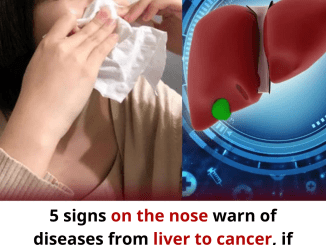Cancer is a deadly disease that often develops unnoticed. Many early symptoms are subtle and can easily be mistaken for minor health issues. However, paying attention to persistent, unusual changes in your body can make all the difference. Early detection significantly improves treatment outcomes, making it essential to recognize potential warning signs before the disease progresses.

General Warning Signs of Cancer
While different types of cancer come with varying symptoms, some general signs may indicate the presence of a growing tumor. If any of these symptoms persist, consult a doctor immediately.
1. Unexplained Weight Loss
Losing weight without trying—especially more than 10 pounds—can be an early warning sign of several cancers, including pancreatic, stomach, esophageal, or lung cancer. Cancer cells consume the body’s energy, and tumors affecting digestion can make it difficult to absorb nutrients properly.
When to Be Concerned:
- Rapid weight loss with no changes in diet or exercise
- Loss of appetite for no apparent reason
- Persistent nausea or bloating
2. Persistent Fatigue
Feeling exhausted despite getting enough rest? Chronic fatigue that doesn’t improve with sleep can be a sign of leukemia or cancers affecting blood cell production. Cancer-related fatigue is different from normal tiredness—it’s overwhelming and doesn’t go away, no matter how much you rest.
Additional Symptoms to Watch:
- Weakness, dizziness, or frequent headaches
- Shortness of breath with minimal activity
- Pale skin, which may indicate anemia caused by cancer
3. Lumps or Swelling in the Body
A lump or swelling in the breast, neck, testicles, underarms, or any other part of the body that doesn’t go away should always be checked. While not all lumps are cancerous, persistent or growing masses can indicate tumors.
Signs That a Lump May Be Cancerous:
- It’s hard, immovable, or painless
- It grows over time
- Skin over the lump appears red, dimpled, or irritated
Specific Symptoms Linked to Different Types of Cancer
Some symptoms point toward specific cancers. Here are crucial warning signs for different cancer types.
4. Unusual Bleeding or Bruising
Blood appearing where it shouldn’t can be alarming. Blood in urine, stool, or coughing up blood can signal cancers of the bladder, colon, or lungs. If you experience unexplained bruising, it could indicate blood cancers like leukemia.
What to Watch For:
- Bright red or dark, tarry stools
- Blood in phlegm or after coughing
- Heavy menstrual bleeding or unusual vaginal bleeding outside of normal cycles
5. Changes in Bowel or Bladder Habits

Sudden changes in bowel or bladder function—such as constipation, diarrhea, blood in the stool, or difficulty urinating—could be signs of colon, bladder, or prostate cancer. If these issues persist for more than a few weeks, seek medical advice.
Warning Signs to Take Seriously:
- Feeling like your bowel doesn’t empty completely
- Frequent urination or trouble starting and stopping urine flow
- Dark-colored urine or pain during urination
6. Persistent Cough or Hoarseness
A cough that lingers for more than three weeks, especially if you’re not sick, could be an indicator of lung, throat, or esophageal cancer. Coughing up blood or experiencing voice changes are also red flags.
When a Cough Is More Than Just a Cold:
- A dry, persistent cough that won’t go away
- Hoarseness or voice changes without an obvious cause
- Coughing up blood or mucus with streaks of blood
7. Chronic Pain That Won’t Go Away
Cancer-related pain is often deep, persistent, and doesn’t respond to regular painkillers. While pain can have many causes, unexplained bone, back, or abdominal pain can indicate cancers spreading to the bones or internal organs.
Where Cancer-Related Pain Often Occurs:
- Bone pain (linked to leukemia or bone cancer)
- Lower back pain (could indicate ovarian, colon, or pancreatic cancer)
- Pelvic pain (may signal cervical or ovarian cancer)
Physical and Skin Changes That Could Signal Cancer
Your skin and body often reveal internal health issues. If you notice persistent skin changes, it’s important to pay attention.
8. Changes in Skin Color or Texture

New moles, changes in an existing mole’s size or shape, or sores that don’t heal could be signs of melanoma or other types of skin cancer. Skin cancer is often overlooked in its early stages but can be life-threatening if not treated promptly.
Signs of Skin Cancer:
- Asymmetrical or irregularly shaped moles
- Dark spots that appear suddenly and grow over time
- Scaly patches, sores that won’t heal, or areas that bleed easily
9. Difficulty Swallowing or Persistent Indigestion
Struggling to swallow or feeling like food is getting stuck in your throat could indicate esophageal, stomach, or throat cancer. Indigestion that doesn’t improve with treatment should also be evaluated.
Additional Symptoms to Watch:
- Feeling full quickly even after eating small amounts
- Pain or burning sensation in the throat or chest
- Frequent nausea or bloating
10. Frequent Infections or Fevers
A weakened immune system could be a sign that cancer is affecting blood cells or the bone marrow. Leukemia, lymphoma, and other cancers can make the body more susceptible to infections and fevers that don’t go away.
When to Seek Medical Attention:
- Frequent colds or infections that take longer to recover from
- Persistent low-grade fever with no known cause
- Swollen lymph nodes that don’t go away
What to Do If You Notice These Symptoms?

If you experience any persistent, unusual, or worsening symptoms, don’t ignore them. Early cancer detection can significantly improve survival rates and treatment success.
Steps to Take:
- Monitor your symptoms – Keep track of any changes and how long they last.
- Schedule a doctor’s appointment – Discuss persistent symptoms with your healthcare provider.
- Request necessary screenings – Blood tests, biopsies, and imaging scans can help diagnose potential cancer.
- Adopt a healthy lifestyle – Quit smoking, limit alcohol, maintain a balanced diet, and exercise regularly.
Final Thoughts: Listen to Your Body and Take Action Early
Cancer often starts silently, but your body gives you warning signs. The key to beating cancer is early detection—so if you notice sudden weight loss, unexplained fatigue, unusual bleeding, persistent pain, or changes in your skin or digestion, don’t wait. Seek medical attention immediately.
Your health is your greatest asset—don’t take it for granted. Stay informed, listen to your body, and prioritize early detection to increase your chances of a healthy, cancer-free life.


